What Dorothy Porter’s Life Meant for Black Studies
Dorothy Porter, a Black woman pioneer in library and information science, created an archive that structured a new field.
Photo: Dorothy B. Porter photographed by Carl Van Vechten, 1951 ©Van Vechten Trust/Carl Van Vechten Papers Relating to African American Arts and Letters, James Weldon Johnson Memorial Collection, Beinecke Rare Book and Manuscript Library
(JSTOR Daily) For more than 150 years, Howard University has been associated with the highest caliber of scholarship on the African diaspora. Howard’s legacy as a hub for the intellectual exploration of Blackness is widely appreciated in the Africana subset of academia. Lesser known is the woman who conceived and facilitated the development of Howard’s wealth of archival resources into one of the primary centers for the study of people of African descent. The story of Dorothy Porter Wesley, a pioneer in the field of library and information science, is also the story of the triumphant beginnings of a new discipline. As a result of Porter’s vision and dedication, Black special collections began to occupy more prominent roles in their institutions, allowing engagement with historically marginalized narratives through the palpable past.
The Moorland-Spingarn Research Center, an administrative unit containing the libraries, university archives, museum, and additional special collections at Howard University is the realization of a vision from centuries past. During the Reconstruction, former Union general Otis Howard and his supporters in Washington, D.C., founded the university that bears his name. From its inception, the school was to have a library. The first board members, many of whom were prominent figures in the local Black community or wealthy northern abolitionists, donated swaths of manuscript material, mostly concerning Africa and abolitionism. (more)
Tales From the Dallas History Archives: Portraits of Dallas ISD In the 1960s
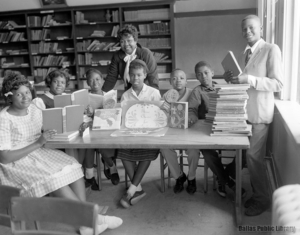
B.F Darrell School Library Week — seven students and teacher in the school library. circa 1963. PA2005-4/81.1, from the Marion Butts Collection, Dallas Public Library
(D Magazine) August is back to school time for many families in Dallas and its neighboring communities. And while this can be a time of anticipation and discovery for young students who find themselves in a new class with new subjects to learn, it wasn’t always this way. Especially not in segregated Dallas.
In the landmark 1954 Supreme Court ruling Brown v. Board of Education, segregation in public education was deemed unconstitutional. This ruling struck down the idea that skin color was an acceptable criterion for deciding which school a child could attend.
Desegregation of the Dallas Independent School District (DISD) was a long process. It involved subsequent court decisions that lingered even after DISD declared itself desegregated after 18 African American students attended previously “white only” schools on Sept. 6, 1961. (more)
Texas History Minute: Dooley Wilson had iconic role in ‘Casablanca’
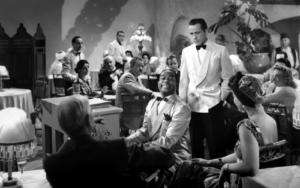
Texan Dooley Wilson is best known for his role as Rick’s friend and piano player Sam in the classic movie “Casablanca.”
For decades, movies have had a special place in American culture. Unforgettable characters and captivating stories have helped define America’s idea of itself. One of the most famous scenes of all time became a legendary moment because of one Texas actor.
The actor was veteran performer Dooley Wilson, and the movie was “Casablanca.”
Born Arthur Wilson in Tyler in April 1886, he had little formal education; but he had a great deal of musical and artistic talent that he put to good use at a young age. By the mid-1890s, he was already working as a singer and stage performer. (more)
Related: “Turner Classic Movies & African American Film Critics Association present The Black Experience on film.
(Fox4KC.com) Turner Classic Movies (TCM) and the African American Film Critics Association (AAFCA) have partnered to bring viewers The Black Experience on Film, a comprehensive month-long programming initiative showcasing portrayals of African Americans throughout cinematic history. (more)
TIPHC Bookshelf
 Published scholarship on black history in Texas is growing and we’d like to share with you some suggested readings, both current and past, from some of the preeminent history scholars in Texas and beyond. We invite you to take a look at our bookshelf page – including a featured selection – and check back as the list grows. A different selection will be featured each week. We welcome suggestions and reviews. This week, we offer, “Desegregating Texas Schools — Eisenhower, Shivers, and the Crisis at Mansfield High,” by Robyn Duff Ladino.
Published scholarship on black history in Texas is growing and we’d like to share with you some suggested readings, both current and past, from some of the preeminent history scholars in Texas and beyond. We invite you to take a look at our bookshelf page – including a featured selection – and check back as the list grows. A different selection will be featured each week. We welcome suggestions and reviews. This week, we offer, “Desegregating Texas Schools — Eisenhower, Shivers, and the Crisis at Mansfield High,” by Robyn Duff Ladino.
In the famous Brown v. the Board of Education decisions of 1954 and 1955, the United States Supreme Court ruled that “separate but equal” schools for black and white students were unconstitutional. Yet history records that it took more than a decade of legal battles, civil rights protests, and, tragically, violent confrontations before black students gained full access to previously white schools.
Mansfield, Texas, a small community southeast of Fort Worth, was the scene of an early school integration attempt. In this book, Robyn Duff Ladino draws on interviews with surviving participants, media reports, and archival research to provide the first full account of the Mansfield school integration crisis of 1956.
Ladino explores how power politics at the local, state, and federal levels ultimately prevented the integration of Mansfield High School in 1956. Her research sheds new light on the actions of Governor Allan Shivers—who, in the eyes of the segregationists, actually validated their cause by his political actions—and it underscores President Dwight Eisenhower’s public passivity toward civil rights during his first term of office.
Despite the short-term failure, however, the Mansfield school integration crisis helped pave the way for the successful integration of Central High School in Little Rock, Arkansas, in 1957. Thus, it deserves a permanent place in the history of the civil rights movement, which this book amply provides.
This Week in Texas Black History
Aug. 27
 Prairie View A&M basketball great Zelmo Beaty died of cancer at age 73 on this day in 2013. A native of Hillister (100 miles northeast of Houston), Beaty played during segregation at all-black Scott High School in Woodville. At PV, Beaty led the Panthers to the 1962 NAIA national championship and was named tournament MVP. He averaged 25 points and 20 rebounds during his collegiate career. Though undersized at 6-9 for a center, Beaty was the third overall pick in the 1962 NBA draft by the St. Louis Hawks and made the NBA All-Rookie Team in 1963 and was a league All-Star in 1966 and 1968 in an era dominated by centers Wilt Chamberlain and Bill Russell. Beaty jumped to the American Basketball Association and led the Utah Stars to their only championship in 1971. In eight NBA seasons, Beaty averaged 16 points and 11 rebounds a game. In 2014, he was named to the National Collegiate Basketball Hall of Fame. In 2012, he was named to the NAIA’s 75th Anniversary All-Star Team.
Prairie View A&M basketball great Zelmo Beaty died of cancer at age 73 on this day in 2013. A native of Hillister (100 miles northeast of Houston), Beaty played during segregation at all-black Scott High School in Woodville. At PV, Beaty led the Panthers to the 1962 NAIA national championship and was named tournament MVP. He averaged 25 points and 20 rebounds during his collegiate career. Though undersized at 6-9 for a center, Beaty was the third overall pick in the 1962 NBA draft by the St. Louis Hawks and made the NBA All-Rookie Team in 1963 and was a league All-Star in 1966 and 1968 in an era dominated by centers Wilt Chamberlain and Bill Russell. Beaty jumped to the American Basketball Association and led the Utah Stars to their only championship in 1971. In eight NBA seasons, Beaty averaged 16 points and 11 rebounds a game. In 2014, he was named to the National Collegiate Basketball Hall of Fame. In 2012, he was named to the NAIA’s 75th Anniversary All-Star Team.
Aug. 28
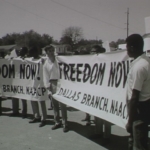 On this date in 1963, in conjunction with the National March for civil rights in Washington, approximately 900 protesters marched on the Texas state capitol in Austin. The group, which included Hispanics, blacks, and whites, attacked the slow pace of desegregation in the state and Gov. John Connally’s opposition to the pending civil rights bill in Washington.
On this date in 1963, in conjunction with the National March for civil rights in Washington, approximately 900 protesters marched on the Texas state capitol in Austin. The group, which included Hispanics, blacks, and whites, attacked the slow pace of desegregation in the state and Gov. John Connally’s opposition to the pending civil rights bill in Washington.
Aug. 30-31
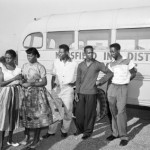 In 1956, defiant white citizens of Mansfield blocked the enrollment of three black students at Mansfield High School in what became known as the “Mansfield School Desegregation Incident.” The school district had been sued by the NAACP and a federal court ordered the district to desegregate – the first such order in Texas. However, Mansfield would not integrate its schools until 1965.
In 1956, defiant white citizens of Mansfield blocked the enrollment of three black students at Mansfield High School in what became known as the “Mansfield School Desegregation Incident.” The school district had been sued by the NAACP and a federal court ordered the district to desegregate – the first such order in Texas. However, Mansfield would not integrate its schools until 1965.
Aug. 30
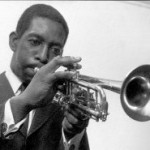 In 1924, Kenny Dorham, jazz trumpeter, was born on this day in Fairfield. A pioneer of the bebop era, Dorham attended Anderson High School in Austin and played in the Wiley College dance band. In the ’40s and ’50s, he played with such greats as Dizzy Gillespie, Billy Eckstine, and Thelonius Monk. Dorham was also a founding member of the Jazz Messengers with Art Blakey.
In 1924, Kenny Dorham, jazz trumpeter, was born on this day in Fairfield. A pioneer of the bebop era, Dorham attended Anderson High School in Austin and played in the Wiley College dance band. In the ’40s and ’50s, he played with such greats as Dizzy Gillespie, Billy Eckstine, and Thelonius Monk. Dorham was also a founding member of the Jazz Messengers with Art Blakey.
Aug. 31
 Frank Robinson, the first black manager in Major League Baseball, was born on this day in Beaumont. Robinson grew up in Oakland and played the bulk of his career with the Cincinnati Reds and Baltimore Orioles. He won the triple crown — leading the league in home runs (49), runs batted in (122), and batting average (.316) — in 1966, and became manager of the Cleveland Indians in 1975. A Baseball Hall of Famer, his 586 career home runs are ninth all-time in MLB.
Frank Robinson, the first black manager in Major League Baseball, was born on this day in Beaumont. Robinson grew up in Oakland and played the bulk of his career with the Cincinnati Reds and Baltimore Orioles. He won the triple crown — leading the league in home runs (49), runs batted in (122), and batting average (.316) — in 1966, and became manager of the Cleveland Indians in 1975. A Baseball Hall of Famer, his 586 career home runs are ninth all-time in MLB.
Sep. 1
 On this day in 1990, Dr. Marguerite Ross Barnett became president of the Univ. of Houston and the first black woman to lead a major American university. From Charlottesville, Virginia she grew up in Buffalo, New York and earned a political science degree from Antioch College and master’s and doctorate degrees in political science from the University of Chicago. A recognized scholar in political science, she taught at Princeton, Howard, and Columbia universities. At UH, she succeeded in raising more than $150 million for the institution, establishing the Texas Center for Environmental Studies, and instituting the nationally renowned Bridge Program, which aided and motivated disadvantaged students to make a successful transition from high school to college. Barnett died of complications from a neuro-endocrinological condition on February 26, 1992.
On this day in 1990, Dr. Marguerite Ross Barnett became president of the Univ. of Houston and the first black woman to lead a major American university. From Charlottesville, Virginia she grew up in Buffalo, New York and earned a political science degree from Antioch College and master’s and doctorate degrees in political science from the University of Chicago. A recognized scholar in political science, she taught at Princeton, Howard, and Columbia universities. At UH, she succeeded in raising more than $150 million for the institution, establishing the Texas Center for Environmental Studies, and instituting the nationally renowned Bridge Program, which aided and motivated disadvantaged students to make a successful transition from high school to college. Barnett died of complications from a neuro-endocrinological condition on February 26, 1992.
Blog: Ron Goodwin, Ph.D., author, PVAMU history professor
Ron Goodwin is an assistant professor of history at Prairie View A&M University. Even though he was a military “brat,” he still considers San Antonio home. Like his father and brother, Ron joined the U.S. Air Force and while enlisted received his undergraduate degree from Texas Lutheran University in Seguin, Texas. After his honorable discharge, he completed graduate degrees from Texas Southern University. Goodwin’s book, Blacks in Houston, is a pictorial history of Houston’s black community. His most recent book, Remembering the Days of Sorrow, examines the institution of slavery in Texas from the perspective of the New Deal’s Slave Narratives.
Recent Posts
Democratic Party – Fifty Years Later
In 1968, the Democratic Party met in Chicago to nominate its candidate for president. The Party was in chaos after the violent deaths of Robert Kennedy and Martin Luther King, Jr. While King was not an acknowledged political figure, his non-violent social stance and his views on American involvement in Vietnam was influencing public policies. Perhaps more influential in the forthcoming implosion of the Democratic Party was the death of Robert Kennedy. (more)
Television — Fifty Years Later
Social pundits often consider 1968 a pivotal year in our democracy. Fifty years later, the deaths of Martin Luther King, Jr. and Robert F. Kennedy have many liberals questioning how compassionate our democracy may have been had they lived. There is no doubt they would have made a powerful one-two punch in eradicating many of the social ills caused by uncontrolled capitalism. Fifty years later we are also dealing with the implosion of the Democratic Party at its national convention and the unexpected return of Richard Nixon via the now vaunted Southern Strategy. (more)
Submissions wanted
Historians, scholars, students, lend us your…writings. Help us produce the most comprehensive documentation ever undertaken for the African American experience in Texas. We encourage you to contribute items about people, places, events, issues, politics/legislation, sports, entertainment, religion, etc., as general entries or essays. Our documentation is wide-ranging and diverse, and you may research and write about the subject of your interest or, to start, please consult our list of suggested biographical entries and see submission guidelines. However, all topics must be approved by TIPHC editors before beginning your research/writing.
We welcome your questions or comments. Please contact Michael Hurd, Director of TIPHC, at mdhurd@pvamu.edu.
